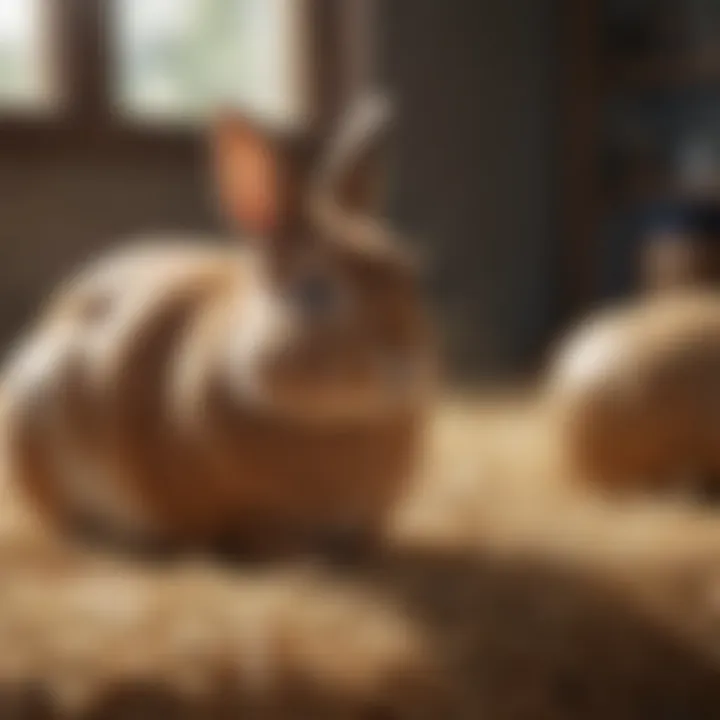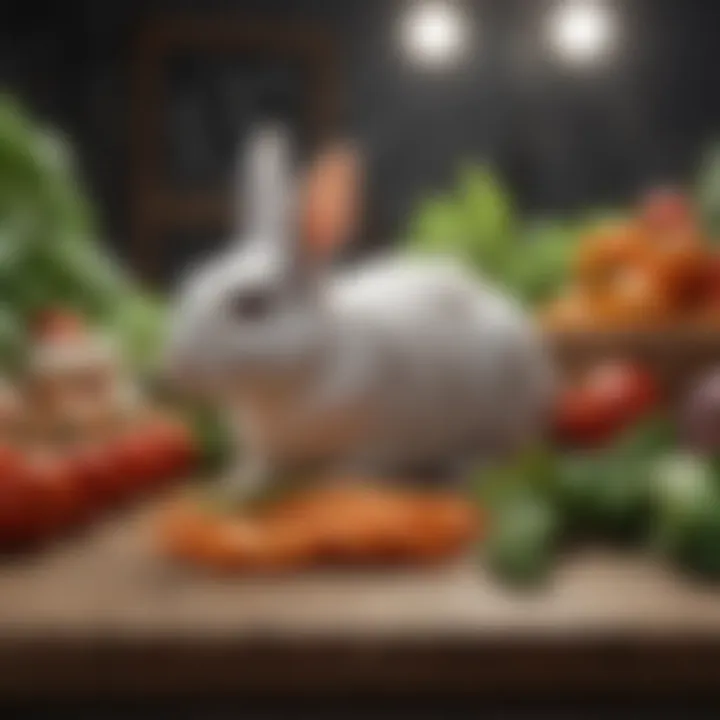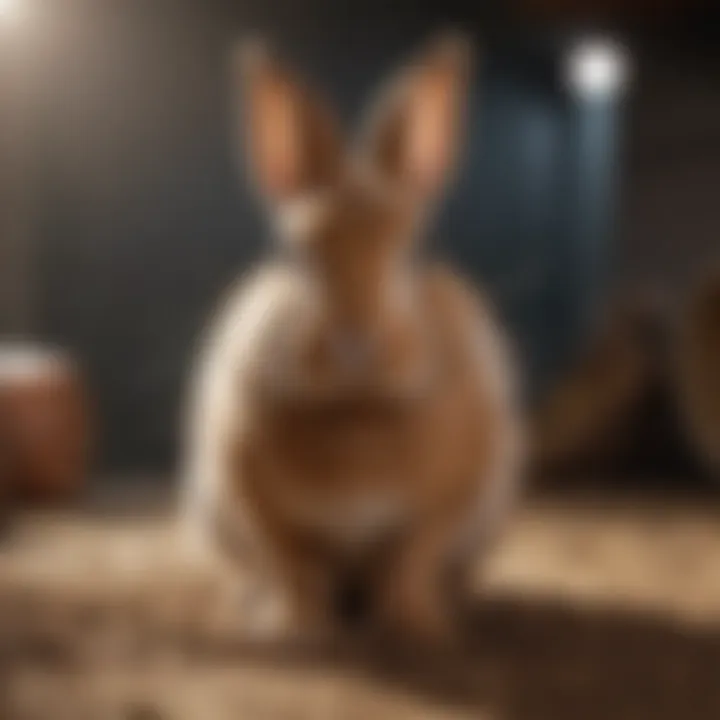Essential Nutritional Insights for Rabbit Care


Intro
Understanding the dietary needs of rabbits is essential for their health. Proper nutrition impacts their well-being significantly. This article focuses on the types of foods beneficial for rabbits. We categorize these foods into hay, fresh vegetables, fruits, and commercial feeds. Each category provides essential nutrients that support rabbit health.
Rabbits are herbivores, and their digestive systems are designed to process fibrous materials. This means hay should form the basis of their diet. Fresh vegetables and fruits offer important vitamins and minerals, while commercial feeds add necessary balance. However, not all human foods are suitable for them; some can even be harmful. Therefore, being knowledgeable about a rabbit’s dietary requirements can lead to a longer, healthier life for these pets.
Understanding Your Pet
In understanding how to care for a rabbit, one must grasp their unique needs and characteristics. This includes their behavior, breed traits, and specific nutritional requirements. A well-informed owner can provide better care and optimize their pet's health and happiness.
Pet Behavior Basics
Rabbits often exhibit various behaviors that reveal their emotional state. They display curiosity, which drives them to explore their environment. This inquisitive nature means they require safe spaces to roam and interact with. Dominance behavior may appear, especially in un-spayed or un-neutered rabbits, which can escalate if not managed properly.
It's essential for pet owners to watch for signs of stress or fear, which may manifest as thumping or hiding. Understanding these behaviors will help owners create a stable and nurturing environment.
Common Breed Characteristics
Different breeds showcase various traits. For example, the Holland Lop is known for its friendly nature, while the Lop-eared breed can be more independent. Knowing a rabbit's breed can help tailor care effectively. Breed influences diet and exercise levels, making this knowledge vital.
Species-Specific Needs
Every species has specific needs. Rabbits particularly require high fiber and low-calcium diets. Fiber keeps their digestive systems functioning properly and prevents potential health issues. Each type of food plays a vital role, and matching the diet to specific rabbit needs is crucial.
Pet Care and Maintenance
After understanding your pet, maintaining their care becomes the next necessary step. Proper nutrition is obviously a part of it, but grooming and hygiene practices also matter.
Feeding Guidelines
Rabbits thrive on pure hay. Timothy hay or orchard grass should dominate their daily diet, supplemented with small portions of fresh leafy greens like romaine lettuce or parsley. Fruits can be treats but should be given sparingly to avoid extra sugar. Your rabbit's ideal weight should also guide portion sizes of commercial feeds like Oxbow or Kaytee, which can provide balanced nutrition.
Grooming Essentials
Regular grooming is needed, especially for long-haired rabbits. Brushing helps reduce shedding and prevents matting. In addition, checking nails and ears is an important aspect of upkeep. Keeping your rabbit groomed improves comfort and promotes a healthier coat.
Hygiene Practices
Hygiene should not be overlooked. Regularly changing litter and ensuring that food and water containers are clean is vital. This reduces the risk of infection and promotes overall health. Keeping their living area tidy helps mitigate odors and ensures a good environment.
Health and Wellness
Establishing health protocols is necessary for a rabbit's long-term well-being. Routine checks and understanding when to seek veterinarian advice can prevent serious issues.
Routine Vet Check-ups
Periodic veterinary visits should be routine. These check-ups help catch any potential health risks early. Asking the vet about optimal vaccination schedules is also important.
Vaccination Needs
Vaccinations against diseases such as myxomatosis and rabbit hemorrhagic disease are crucial. Keeping vaccinations current is an essential part of responsible rabbit ownership.
Recognizing Signs of Illness
Owners should swiftly identify signs of illness. Changes in appetite, lethargy, or altered behaviors often signal trouble. Recognizing these early signs can lead to quicker interventions and better outcomes.
Enrichment and Activities
Understanding nutrition is vital, but it goes hand in hand with enrichment and activity levels. Play and social interaction promote good mental and physical health.
Indoor vs.
Outdoor Activities
Indoor rabbits benefit from space to hop around safely. Providing structured playtime encourages activity. Outdoor bunnies can explore a safe, enclosed garden, allowing for natural behaviors and exercise. Each environment provides unique benefits.
Interactive Toys and Games
Interactive toys can stimulate your rabbit's mind. Toys made from safe, chewable materials are great options. Hiding treats within toys encourages play and exploration.
Socialization Opportunities
Rabbits are social creatures. They thrive in environments where they can interact with other rabbits or humans. Proper introductions help develop healthy social habits.
Understanding your rabbit's nutritional and environmental needs enhances their quality of life, ensuring they thrive in their home.
In summary, providing the right nutrition and care for rabbits is crucial. Rabbits require specific foods that cater to their dietary needs while also ensuring a healthy and enriched environment. Each detail plays a significant role in ensuring that these pets experience the best possible care.
Foreword to Rabbit Nutrition
Understanding rabbit nutrition is critical for the health and overall well-being of these animals. Rabbits are herbivores, requiring a specific blend of nutrients to thrive. The right diet not only promotes good health but also enhances happiness and longevity. This article aims to highlight the essential components that make up an ideal diet for rabbits.
Proper nutrition plays a significant role in preventing diseases and ensuring proper digestive health in rabbits. A balanced diet can influence behavior, growth, and reproductive capabilities. Additionally, awareness of nutritional needs helps owners avoid common pitfalls that can lead to obesity, dental issues, and gastrointestinal problems.
Key considerations when assessing rabbit nutrition include fiber content, which is vital for maintaining gut motility, as well as adequate vitamins, minerals, and protein levels. For instance, hay should form the foundation of a rabbit's diet, serving as a primary source of fiber. Fresh vegetables and a limited amount of fruit can provide necessary vitamins, while commercial feeds can help round out nutritional gaps when chosen wisely.
Rabbit health depends significantly on dietary choices made by the owner. An informed approach to nutrition can lead to happier and healthier rabbits.
In summary, understanding nutritional insights for rabbits helps pet owners provide optimal care. A proper diet supports rabbit health, enhances their quality of life, and fosters a strong bond with their human caregivers.
The Role of Diet in Rabbit Health
Diet plays a pivotal role in rabbit health, affecting every aspect of their well-being. Rabbits are herbivores, necessitating a diet rich in fibrous materials, primarily hay. A well-structured diet not only supports physical health but also impacts behavioral aspects. When rabbits consume a balanced diet, they maintain a healthy weight, ensure proper digestion, and sustain a robust immune system. Conversely, poor nutrition can lead to multiple health issues, including obesity, dental problems, and gastrointestinal disorders.
One of the most significant aspects of a rabbit's diet is the fiber content. Fiber aids in digestion, promotes dental health, and prevents obesity. A lack of adequate fiber can result in severe health problems such as intestinal blockages. Additionally, the right balance of vitamins and minerals is crucial in supporting overall health. For example, calcium and phosphorus play critical roles in bone health and are vital for young rabbits as they grow.
Moreover, proteins are necessary for growth and development. While leafy greens and vegetables provide essential vitamins, the right sources of protein must be included without overwhelming the diet with too many calories. It is essential to recognize that not all foods are appropriate, and it is crucial to avoid harmful substances that can result in toxicity.
It is advisable for rabbit owners to observe and adjust the diet as needed. Monitoring for any signs of distress or changes in behavior can provide valuable insights into the rabbit's digestive well-being. One often overlooked element is water intake. Dehydrated rabbits may suffer from severe health issues, stressing the need for constant access to fresh water.


A balanced diet is not just about what rabbits eat but also encompasses how much and how often.
Essential Components of a Rabbit's Diet
Understanding the essential components of a rabbit's diet is vital for their overall health and well-being. Proper nutrition not only supports the normal functioning of their bodies but also influences behavior, energy levels, and growth. The key elements to focus on include fiber, vitamins, minerals, and proteins. Each plays a unique role in promoting good health, preventing diseases, and ensuring your rabbit thrives.
Fiber Requirement
Fiber is the cornerstone of a rabbit's diet. Rabbits have a specialized digestive system that requires a high intake of fiber to function correctly. Fiber aids in digestion by promoting healthy gut motility. It also helps prevent obesity, as a high-fiber diet keeps rabbits feeling full without excess calories. The primary source of fiber should be hay, with a target of around 70% of their overall diet.
Choosing the right types of hay, such as Timothy Hay and Orchard Grass Hay, is important. These hays are high in fiber and low in protein and calcium. High-quality hay ensures your rabbit maintains a healthy gut, reducing the chances of gastrointestinal stasis, a painful condition affecting many rabbits.
Vitamins and Minerals
A balanced diet must include essential vitamins and minerals, which can be found in various foods. Some vital nutrients for rabbits include vitamin A, calcium, and phosphorus. Vitamin A is crucial for maintaining vision and immune function. Calcium supports strong bones and teeth but must be consumed in moderation to prevent kidney problems.
Leafy greens like kale and collard greens are rich in these vitamins and should be included regularly. On the other hand, it's essential to avoid over-feeding calcium-rich foods like cilantro and alfalfa hay, especially for adult rabbits. Proper monitoring is necessary to balance nutrient intake and to ensure overall health.
Proteins in Rabbit Diet
Proteins play an important role in your rabbit's diet, though they are required in smaller amounts compared to other nutrients. Proteins help in growth, tissue repair, and maintaining healthy fur. Young rabbits and pregnant or nursing females have higher protein needs compared to adults.
High-quality rabbit pellets often provide enough protein for adult rabbits. However, when introducing protein-rich foods, it is essential to choose wisely. Options like cooked beans or legumes can provide extra protein, but these should be offered in moderation to avoid digestive issues.
In summary, understanding and implementing these essential dietary components will facilitate optimal health for your rabbit. By prioritizing fiber, vitamins, minerals, and proteins, you can ensure a well-rounded diet that supports your pet's health and happiness.
Proper nutrition is key for rabbits; always prioritize fiber-rich foods and monitor vitamin and protein intake.
Hay: The Foundation of Rabbit Nutrition
Hay serves as the core component of a rabbit's diet, necessitating a focused exploration of its critical role. This fiber-rich food not only aids digestion but also contributes to dental health, making it indispensable for rabbits at all life stages. A diet lacking sufficient hay can lead to serious health issues, including gastrointestinal problems and dental disease. Therefore, understanding the various types of hay available, along with their unique characteristics and benefits, is essential for any rabbit owner.
Types of Hay Suitable for Rabbits
Timothy Hay
Timothy Hay is widely regarded as a top choice for rabbit nutrition. It is a grass hay that provides high fiber and low protein, making it ideal for maintenance diets. The key characteristic of Timothy Hay is its balanced nutritional profile, which helps in preventing obesity in rabbits. Its unique feature is the presence of seed heads, which adds texture and encourages chewing, promoting good dental health. One disadvantage of Timothy Hay is that it can vary in quality, depending on the harvest. However, when high-quality, it stands out as a beneficial choice in a rabbit's diet.
Orchard Grass Hay
Orchard Grass Hay is another excellent option for rabbits. Its softer texture makes it appealing to many rabbits, particularly those who might be picky eaters. The key characteristic of Orchard Grass Hay is its rich fiber content and palatable flavor, which encourages consumption. This hay is particularly beneficial for young rabbits or those with dental issues who may struggle with coarser hays. However, it has a slightly lower calcium content than Timothy Hay, which should be considered when planning a rabbit’s overall diet.
Meadow Hay
Meadow Hay comprises various grasses and wildflowers, offering diversity in texture and taste. This variability can be highly beneficial as it introduces different nutrients and flavors into a rabbit's diet. The key characteristic of Meadow Hay is its high fiber content, which supports digestive health. Its unique feature lies in the mix of plants it contains, which can promote curiosity and enjoyment during feeding. A possible disadvantage could be that some rabbits may be less inclined to eat it if they prefer a more uniform texture.
Importance of Hay in Diet
Hay is fundamental to a rabbit's diet for several reasons. First, it provides the necessary fiber that ensures a healthy digestive system. Rabbits require constant fiber intake to keep their gut moving; insufficient fiber can cause serious health problems. Additionally, hay helps to wear down the teeth, which grow continuously throughout a rabbit's life. Furthermore, hay makes up the bulk of a rabbit's forage, promoting natural foraging behavior, which is vital for their mental well-being. Each rabbit owner must prioritize hay in daily feeding routines to maintain optimal health and vitality.
Fresh Vegetables: A Source of Essential Nutrients
Fresh vegetables play a critical role in the diet of rabbits. They provide essential nutrients that contribute to overall health and well-being. Rabbits are herbivores, and their natural diet includes a variety of vegetables. Offering fresh vegetables can enhance their nutrition and provide necessary vitamins and minerals. Incorporating the right types of vegetables will also encourage natural foraging behavior, benefiting their mental and physical health.
Approved Vegetables for Rabbits
Leafy Greens
Leafy greens are an important part of rabbit nutrition. They are rich in vitamins A, C, and K, along with essential minerals such as calcium. Their high fiber content promotes healthy digestion. Popular leafy greens include romaine lettuce, kale, and spinach.
However, spinach should be given only in moderation because it contains oxalates, which can inhibit calcium absorption. Leafy greens are often a favorite among rabbits due to their crisp texture and fresh taste. Keeping a variety in the diet can prevent boredom and ensure balanced nutrition.
Root Vegetables
Root vegetables also contribute significantly to a rabbit's diet. Carrots and radishes are excellent choices. Root vegetables contain natural sugars and are best served in moderation. They add variety and can be a delightful treat for rabbits. The key characteristic of root veggies is their crunchy texture, which encourages chewing.
This chewing action helps keep their teeth healthy. However, it is essential to ensure that root vegetables do not become the primary food source due to their higher sugar content. A small amount can suffice as an occasional supplement to their diet.
Herbs
Herbs are another valuable source of nutrients for rabbits. They provide various vitamins and antioxidants while adding flavor and variety to the diet. Common herbs such as basil, parsley, and cilantro are great options. They are simple to grow at home and can enrich a rabbit's diet significantly.
One significant feature of herbs is their aromatic qualities, which can entice rabbits to eat. Including herbs can promote overall health, but it is important to introduce them gradually to avoid upsetting the stomach.
Serving Sizes and Frequency
When offering fresh vegetables, the serving size and frequency are crucial factors. Generally, a rabbit should get about one cup of mixed vegetables for every two pounds of body weight per day. Introducing new vegetables slowly helps in monitoring for any adverse reactions.
Rabbits benefit from a variety of vegetables throughout the week, ensuring they receive diverse nutrients. A good practice is to rotate the vegetables to keep their meals interesting while meeting their nutritional needs.
Always consult with a veterinarian for specific dietary recommendations tailored to your rabbit's individual health requirements.
Fruits: Treats or Essentials?
Fruits are often seen as delightful treats for rabbits, but how essential are they really? Integrating fruit into a rabbit's diet can provide a variety of vitamins, minerals, and natural sugars. However, the importance of fruits should be weighed against their sugar content, leading to a balanced approach.
Moderation plays a key role in introducing fruit. Rabbits in the wild do not have a constant access to fruits, so it should not become a staple in their diet. Instead, fruits should complement the main components, such as hay and vegetables. This prevents overconsumption of sugar, which could lead to health issues like obesity.
Understanding the distinction between treats and essentials is crucial for rabbit owners. Fruits can enhance the dietary variety and provide enrichment, but they should not replace more nutritious food options. Let's explore what fruits are safe for rabbits and the specific limitations that come with fruit consumption.
Fruits Safe for Rabbits
Certain fruits can be safely offered to rabbits, serving as healthy snacks. Some of the most common ones include:
- Apples (without seeds)
- Blueberries
- Strawberries
- Bananas (in small amounts)
- Raspberries
These fruits not only provide essential vitamins like Vitamin A and C, but also antioxidants that can support overall health. It is important to wash all fruits thoroughly to remove pesticides and chemicals before offering them to your rabbit. Additionally, always introduce new fruits slowly to monitor for any adverse reactions.
Limitations on Fruit Consumption
While fruits have their benefits, there are limitations to consider. Each rabbit differs in dietary needs and tolerance, which makes moderation vital. Here are some key limitations to be aware of:


- Sugar Content: Excessive sugars can lead to obesity and gastrointestinal problems, making it essential to limit fruit intake to small portions.
- Frequency of Offering: Fruits should be offered as occasional treats rather than daily. A good rule is to offer fruit no more than a few times a week.
- Individual Reactions: Not all rabbits will react the same to certain fruits. Watch for signs of digestive upset or allergies and adjust accordingly.
Important Note: Always prioritize fresh hay and vegetables over fruits in a rabbit's diet to ensure their health and well-being.
Commercial Rabbit Feeds: Understanding Formulations
Understanding commercial rabbit feeds is vital for any rabbit owner. These feeds are designed to complement the natural diet of rabbits, providing a convenient source of essential nutrients. Rabbits benefit from a well-rounded diet, which includes a mix of good quality hay, fresh vegetables, and safe fruits. However, commercial feeds play a significant role in ensuring a balanced intake of fibers, proteins, vitamins, and minerals that may sometimes be difficult to achieve through natural sources alone.
The formulations of commercial rabbit pellets vary widely. Some are high in fiber to support digestive health, while others might emphasize added vitamins and minerals. The selection may include variations tailored for different life stages or specific health needs. Therefore, it is important to choose the right type based on your rabbit’s age, breed, and health condition.
Types of Rabbit Pellet Feeds
There are several types of rabbit pellet feeds available, each serving a different purpose:
- Performance Pellets: These are made for growing rabbits or those who are pregnant or lactating. They often contain higher protein content to support growth and lactation.
- Maintenance Pellets: Designed for adult rabbits not involved in breeding activities, these formulas focus on providing the necessary nutrients without excess calories.
- High-Fiber Pellets: These pellets focus on fiber content, which is crucial for digestive health, minimizing the risk of gastrointestinal issues. A typical high-fiber pellet may contain added timothy hay, which is beneficial.
- Grain-Free Options: Some products are grain-free, making them suitable for rabbits with sensitivities to grains. Such feeds may derive their carbohydrates from other sources like fruits or vegetables.
Selecting the right feed involves considering each type and matching it to the specific dietary needs of your rabbit.
Evaluating Feed Quality
When evaluating the quality of commercial rabbit feeds, several factors should be considered:
- Ingredient Transparency: Quality feeds will provide a clear list of ingredients, allowing you to identify quality protein sources and avoid unnecessary fillers.
- Nutritional Analysis: Check for a guaranteed analysis label that indicates the minimum levels of fiber, protein, and fat. High-quality feeds usually have 18% or more fiber content to support healthy digestion.
- Expiration Dates: Ensure that the feed is fresh. A product that is past its expiration date may not provide the same nutritional benefits and could be harmful.
- Brand Reputation: Research the brand or manufacturer. Look for companies with a good reputation for quality and safety in pet foods.
Evaluating feeds meticulously helps in making informed choices that support the health and well-being of your rabbit.
Always consult with a veterinarian if you are unsure about the best feed for your rabbit or changes to their diet.
Water: The Often Overlooked Essential
When considering rabbit nutrition, water often does not receive the attention it deserves. It is a critical component of a healthy diet that supports various bodily functions. Proper hydration is essential for digestion, nutrient absorption, and overall wellness. A well-hydrated rabbit is more likely to maintain its health and energy levels.
Rabbits primarily get their water from fresh vegetables and hay, but this may not always be sufficient, especially in hot weather. Understanding daily water needs is fundamental for rabbit owners.
Daily Water Needs
Rabbits require a consistent supply of fresh water every day. The average water intake can vary based on factors like size, diet, and environmental conditions. A general guideline suggests that an adult rabbit needs about 100 to 150 milliliters of water per kilogram of body weight each day.
- Size Matters: Larger rabbits need more water compared to smaller ones. A 2-kilogram rabbit may require roughly 200 to 300 milliliters of water daily.
- Diet Influence: Rabbits on a diet rich in hay and fresh vegetables may need less water compared to those solely on dry pellets. Leafy greens provide moisture that contributes to overall intake.
- Seasonal Changes: In warmer months, rabbits might drink more. Higher temperatures increase their water needs significantly.
Monitoring water consumption is vital. If a rabbit appears less active or shows signs of lethargy, it could indicate dehydration, warranting immediate action.
Methods of Providing Water
Providing water can be accomplished through various methods, ensuring that your rabbit always has access.
- Water Bowls: A shallow bowl is a common option. It’s easy for rabbits to drink from, but it requires regular cleaning to prevent contamination.
- Water Bottles: Some prefer using water bottles with sipper tubes. This method can keep water clean longer and prevents spills. However, it is essential to regularly check that the tube is not clogged, as this could prevent water access.
- Hydration Through Food: Including vegetables with high water content can also help with hydration. Some good options are romaine lettuce, cucumber, and celery.
Foods to Avoid: Protecting Your Rabbit's Health
Understanding what foods should be avoided in a rabbit's diet is crucial for ensuring their health and longevity. Rabbits have sensitive digestive systems, and even a small amount of the wrong food can lead to severe health issues. This section emphasizes the importance of recognizing harmful foods as part of proper rabbit care. By being informed, rabbit owners can safeguard their pets against unnecessary discomfort and health complications that may arise from inappropriate dietary choices.
Toxic and Harmful Foods
Rabbits are herbivores, but some common foods can be toxic or harmful to them. Avoid feeding rabbits the following:
- Avocado: Contains persin, which can be lethal.
- Chocolate: Contains theobromine, toxic to many animals including rabbits.
- Caffeine: Found in coffee and tea, caffeine is harmful to rabbits.
- Onions and Garlic: These can damage red blood cells and lead to anemia.
- Potatoes: Raw potatoes contain solanine, which is harmful; cooked potatoes still have risks.
- Rhubarb: Contains oxalic acid, which is toxic.
- Corn: While not toxic, it may lead to digestive issues.
Every pet owner should be vigilant. Even small amounts can pose risks. If there is doubt, always consult with a veterinarian to clarify whether a specific food is safe for rabbits.
Potential Allergens
Just as humans can have allergies to certain foods, rabbits may also have sensitivities. Some rabbits might react negatively to foods that are otherwise considered safe. Pay attention to any unusual behavior or changes in health when introducing new foods. Consider these common allergens:
- Certain leafy greens: Some rabbits may react to kale or spinach.
- Fruits: While fruits can be healthy in moderation, some rabbits may show signs of digestive upset.
- Grains: Too much grain can lead to soft stools or diarrhea.
If a rabbit is exhibiting symptoms like itching, gastrointestinal trouble, or lethargy after eating a certain food, it may be wise to eliminate it from their diet. Monitoring their response is essential.
Careful monitoring and avoiding hazardous foods can prevent serious health complications in rabbits.
Special Considerations for Young Rabbits
When it comes to rabbit nutrition, young rabbits merit special attention. Their growth demands a well-balanced diet that supports not only their physical development but also their overall well-being. Young rabbits, typically considered to be under six months of age, have unique dietary needs compared to adult rabbits.
First, it is important to understand the nutritional requirements of growing rabbits. They require higher levels of protein and calories to support their rapid growth rates. An inadequate diet can lead to health issues such as malnutrition, stunted growth, and weakened immune systems. Therefore, selecting the right food at this stage is critical.
A proper diet for young rabbits should include:
- High-quality hay such as Timothy Hay or Orchard Grass Hay, which provides essential fiber.
- Commercial rabbit pellets formulated specifically for young bunnies, as they contain the necessary nutrients for growth.
- Fresh vegetables introduced gradually, keeping in mind any potential allergens.
Furthermore, young rabbits have specific needs when it comes to water intake. Owners should ensure that they always have access to clean, fresh water. The importance of hydration cannot be overlooked, as it plays a significant role in digestion and overall health.
In summary, the dietary choices for young rabbits greatly influence their development. By paying close attention to their nutritional needs, owners can lay a strong foundation for their long-term health and happiness.
Dietary Needs for Growing Rabbits
The dietary needs of growing rabbits can be more nuanced than one might anticipate. The first few months are crucial, and it is essential to provide meals that meet their needs.
Here are key elements that should be considered:
- Protein: Young rabbits should receive a diet rich in protein, approximately 16-18% in their pellets, to support muscle growth.
- Vitamins and Minerals: Calcium and phosphorus levels should be balanced properly. This balance is pivotal for bone development and preventing issues like urinary calciums.
- Fiber: Young rabbits require good quality grass hay that encourages proper digestive function and prevents gastrointestinal problems.
When introducing new foods, take a gradual approach to monitor for any adverse reactions. A sudden change in diet may cause digestive upset.
By being proactive in their diet, rabbit owners can contribute significantly to the well-being of their growing bunnies. A well-planned dietary strategy will not only meet their immediate nutritional needs but also set the stage for a healthy adult life.
Adapting Diets to Specific Rabbit Breeds
Nutritional needs for rabbits can vary widely depending on their breed. Larger rabbits, such as Flemish Giants, will require different dietary considerations compared to smaller breeds like Netherland Dwarfs. A holistic understanding of each breed's unique needs can significantly impact their health and well-being.


Importance of Tailored Diets
Understanding the specific dietary requirements of different rabbit breeds is critical for several reasons:
- Body Size and Fiber Needs: Larger breeds generally need more food than smaller breeds to meet their energy demands. They may also need more fiber, as it supports proper digestion and avoids common gastrointestinal issues.
- Metabolism Differences: Each breed has a different metabolic rate. This influences the quantity and type of food necessary. Breeds with higher activity levels may benefit from a protein-rich diet, while others with lower energy demands might not need such intense nutrients.
- Growth Stages: Young rabbits require a diet higher in protein and essential nutrients to support growth, while adult rabbits typically need a maintenance diet focused on fiber and lower calorie counts.
Breed-Specific Considerations
Fiber Requirements
Different breeds may have varying fiber needs. All rabbits need high-fiber hay, but the quantity can differ.
Fresh Vegetables
Some breeds have preferences for specific vegetables. Research suggests that certain leafy greens might be more appealing to some rabbits.
Commercial Feeds
When choosing commercial pellet feeds, consider breed-specific formulations. Larger breeds may do better with higher fiber content while smaller breeds can thrive on lower fiber levels.
Benefits of Adapting Diets
Adapting diets to specific rabbit breeds can lead to:
- Healthier Rabbits: Proper nutrition can prevent diseases related to poor diet, such as obesity or dental problems.
- Improved Behavior: Rabbits not receiving adequate nutrition may display lethargy or aggression. A well-balanced diet helps promote a calm demeanor.
- Enhanced Lifespan: A tailored diet can enhance overall health, leading to a longer, happier life.
The Relationship Between Diet and Behavior
Understanding the connection between a rabbit's diet and its behavior offers insights into how what they eat can influence their overall well-being. For pet owners, being aware of this relationship ensures that rabbits not only receive the proper nutrition but also exhibit healthy behaviors.
A balanced diet directly affects a rabbit's physical health. Insufficient fiber or inappropriate food choices can lead to digestive problems, which may manifest in behavioral changes. For example, if a rabbit is not getting enough hay, it may become lethargic or irritable. In contrast, a diet rich in hay, fresh vegetables, and suitable pellets contributes to high energy levels and playful behavior.
Specific Elements of the Relationship
- Emotional Well-Being: A nutritious diet can positively influence a rabbit's mood. Fresh greens and the right vegetables can lead to contentment and comfort, whereas poor dietary choices may lead to stress or anxiety.
- Social Interaction: Rabbits are social creatures. A well-fed rabbit is likely to engage more with its environment, interacting positively with other pets or humans. On the other hand, a lack of nutrition can lead to withdrawal and reduced social behavior.
- Exploration and Activity: Rabbits are naturally curious and active animals. A proper diet fuels their natural instinct to explore. When they feel good physically, they are more likely to exhibit their natural behaviors, such as hopping around and investigating their surroundings.
- Grooming Habits: A rabbit's diet can also affect its grooming behaviors. Good nutrition leads to healthier fur and skin, which encourages regular grooming. A rabbit that feels unwell due to poor nutrition might neglect grooming, leading to matting and other hygiene issues.
“Healthy diet promotes not just physical health, but emotional and social well-being in rabbits.”
Benefits and Considerations
- Regularly monitor their rabbit's food intake and ensure it includes essential nutrients.
- Observe behavioral changes that may arise from dietary adjustments.
- Be open to consulting with a veterinarian if noticeable changes in behavior occur after a diet change.
Fostering a healthy diet is crucial in promoting positive behaviors in rabbits. Understanding this relationship enhances the quality of life for these pets and strengthens the bond between owners and their furry companions.
Nutritional Myths: Debunking Common Misconceptions
Understanding the nutritional needs of rabbits is crucial. However, many misconceptions circulate about what constitutes appropriate food for these animals. Debunking these myths ensures that rabbit owners can provide a diet that promotes optimal health and well-being.
Common Myths
Here are a few prevalent myths related to rabbit nutrition:
- Myth 1: Rabbits Can Live on Carrots Alone
Many people associate rabbits with carrots, thanks to popular media. However, carrots are high in sugar and not suitable as a primary food source. While they can be offered occasionally, hay and leafy greens should constitute the majority of their diet. - Myth 2: Any Type of Hay is Good for Rabbits
Not all hay is created equal. Some varieties lack the necessary fiber content. Timothy hay, for example, is often recommended due to its high fiber levels. Providing a mix of hays like Orchard grass hay and Meadow hay can ensure a balanced intake. - Myth 3: Pellets are Sufficient for Nutrition
Commercial rabbit pellets often contain nutrients, but they should not replace fresh vegetables and hay. Varied diets are essential. Too many pellets can lead to obesity and related health issues, making it important to moderate their intake.
“A balanced diet is not just about quantity; it’s about quality and variety.”
Consequences of Misunderstanding Nutrition
Believing in these myths can lead to serious health issues for rabbits. Problems may include:
- Digestive problems: A lack of fiber can lead to intestinal stasis, which is a critical condition.
- Dental issues: An improper diet can cause misalignment of teeth, leading to pain and complications in eating.
- Obesity: A diet too high in sugary fruits or pellets can cause weight gain, increasing the risk of various diseases.
Benefits of Accurate Knowledge
Correcting these nutritional misconceptions allows owners to:
- Provide balanced diets full of essential nutrients.
- Improve life quality of their pets through healthier eating practices.
- Avoid unnecessary health issues and veterinary visits.
Conclusion
By dispelling nutritional myths, rabbit owners can offer diets that align with the natural habits and needs of their pets. Prioritizing proper nutrition not only fosters physical health but contributes to a happier rabbit. Continuous education and awareness about rabbit nutrition are invaluable in rearing a healthy pet.
Monitoring and Adjusting Diet
Monitoring and adjusting the diet of your rabbit is essential for its overall health and well-being. Rabbits are sensitive creatures, and any changes in their diet can significantly affect their digestive health, energy levels, and behavior. As a rabbit owner, recognizing the signs of nutritional deficiencies and knowing when to consult a veterinarian are crucial components in ensuring the longevity and happiness of your pet.
Recognizing Signs of Nutritional Deficiencies
Rabbits rely on a balanced diet to thrive. Changes in eating habits or behavior can be indicators of nutritional deficiencies. Some signs that your rabbit may not be getting the proper nutrients include:
- Weight Loss: A decline in body weight can signal inadequate nutrition.
- Poor Coat Condition: Dull or unkempt fur may indicate deficiencies in essential fatty acids or vitamins.
- Lethargy: A lack of energy can suggest that your rabbit is not getting enough calories or nutrients.
- Digestive Issues: Diarrhea or signs of discomfort can result from an unbalanced diet.
- Changes in Behavior: Increased irritability or withdrawal from activities can point to health problems.
If you notice any of these signs, it is crucial to assess your rabbit’s diet carefully. Ensure that they receive a variety of hay, fresh vegetables, and the appropriate amount of commercial pellets.
When to Consult a Veterinarian
Understanding when to seek veterinary advice is vital in a rabbit's care. If you observe persistent changes in your rabbit’s behavior, eating habits, or health, a veterinarian's guidance can help. Consider the following situations:
- If your rabbit shows signs of severe weight loss or lethargy.
- Persistent digestive issues that do not resolve with dietary changes.
- Any sudden changes in behavior that could indicate pain or distress.
Always consult a veterinarian if unsure about your rabbit's nutritional needs or health. Proper care can prevent more serious health issues down the line.
Regular check-ups can also help monitor your rabbit’s health and nutritional status. Making informed dietary decisions and knowing when to seek professional help is key to maintaining a happy and healthy rabbit.
End: Key Takeaways for Rabbit Owners
To ensure the health and well-being of rabbits, understanding the intricacies of their dietary needs is vital. This conclusion synthesizes the essential points discussed throughout the article, reinforcing the significance of proper nutrition.
A rabbit's diet should focus on high fiber, low sugar, and moderate protein intake. Hay forms the cornerstone of their nutrition, providing necessary fiber for digestive health. Varieties like Timothy Hay, Orchard Grass Hay, and Meadow Hay should be incorporated consistently into their meals.
Fresh vegetables are also crucial. Leafy greens, root vegetables, and herbs offer essential vitamins and minerals. However, serving sizes should be managed to avoid overfeeding. The incorporation of fruits can be an occasional delight, but their consumption must be monitored due to high sugar content.
Commercial feeds, such as high-quality pellets, should supplement their diet but not replace more natural options like hay and vegetables. Quality over quantity is key, and monitoring feed ingredients will ensure that rabbits receive the nutrients they need without unnecessary fillers.
Water is often overlooked but equally important. Ensuring fresh water is available daily promotes hydration and aids in digestion.
It is also wise to recognize the foods that can be harmful to rabbits. Toxic items must be strictly avoided to protect their health.
In summary, informed dietary choices based on the discussed elements can significantly enhance a rabbit's quality of life. Understanding these key factors allows owners to provide an optimal environment for their pets, fostering their long-term health and happiness.
"Proper nutrition is the foundation of a rabbit's health, influencing not just their physical well-being but also their behavior and interactions."
Utilizing this information empowers rabbit owners as they navigate the complex world of rabbit care. Keeping these insights in mind can lead to a fulfilling and healthy life for pet rabbits.







